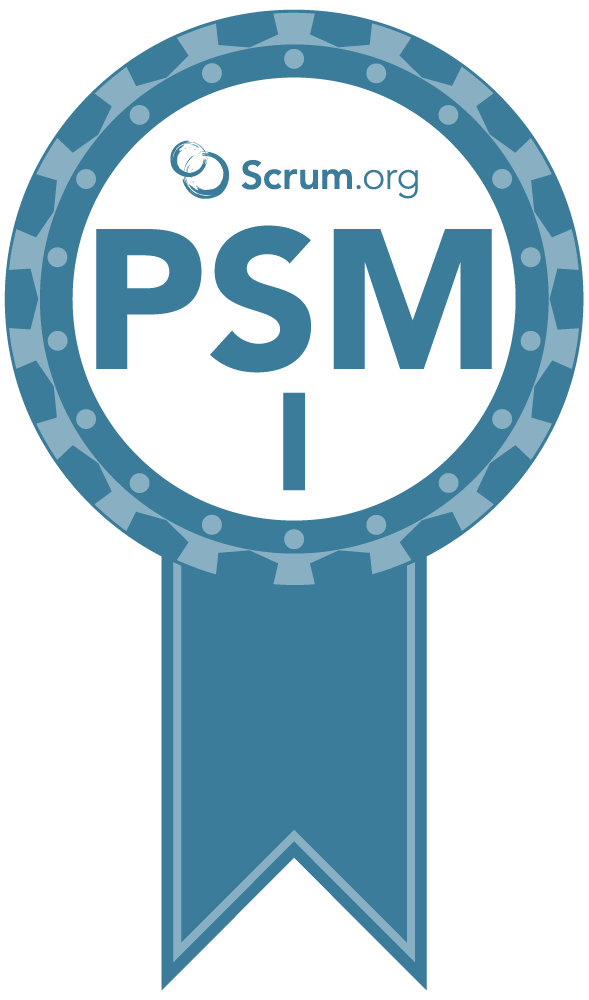A Popular Choice
PSM I?
If you’re looking to get into Professional Scrum, this might be the first one that comes to mind - and why wouldn't it? With strong industry recognition, a suitably challenging assessment and good availability of learning materials, it’s a great choice. If you were to go onto indeed.com, reed.co.uk or any other job listing website, you would see it listed as the primary requirement for so many Scrum & Agile roles. So, why am I telling you that it might not be the best choice for you? In fact, I’m not… read the title of this blog again.
Many people forget that the PSM I is a certification and not a training class. Whilst one often directly leads to the other, they are not equivalents. One is a method to gain knowledge and the other is a method to validate it. Who do you think the Professional Scrum Master class is for? It’s not a trick question – it’s for Scrum Masters, or those looking to become one. To meet that outcome, the PSM training delivers a curriculum focused on Scrum theory and your knowledge to be able to function as a Scrum Master. We cover scenarios, case studies, and techniques designed to help you to fulfil this specific accountability. As amazing as the class is, it contains a lot of information that is perhaps less relevant to those not looking to become Scrum Masters.
If you want to become a Scrum Master, then the PSM training and certification is for you. But what if you want to learn Professional Scrum, but don’t want to take a class focused on becoming a Scrum Master? Now we’ve hit on the purpose of this post.
A Better Choice?
For 90% of the private clients I work with, they are interested in exactly this outcome – helping their teams and employees to have a grounding in Professional Scrum. It’s a laudable aim – after all, you can’t hope to leverage the value of a framework that you don’t understand. But due to many reasons which include brand positioning and client misunderstanding, training managers will often jump to book a private class – the Professional Scrum Master (PSM). As a business owner, I’m always happy to arrange it for them – but I’d be remiss if I didn’t ask them what outcome they want from a booking like this. Do you want ten Scrum Masters? Or do you want ten participants to understand Professional Scrum?
What if I told you there was a way to support this second outcome, without training them to become Scrum Masters? Because there is.
My favorite class to teach in the Professional Scrum series of training is the Applying Professional Scrum (APS) class. Why? It offers a foundational knowledge of Scrum theory whilst being coupled with experiential learning - learn Scrum by doing it. In short, APS is focused on experiencing how Professional Scrum works in practice. Who is it targeted at? Everyone. In fact, we recommend you to bring entire teams who are looking to use Scrum to accelerate their value delivery because it’s appropriate to Scrum Masters, Product Owners, Developers and organisational management. If you need another reason to consider it, it’s also certified against the same assessment as the Professional Scrum Master training – the PSM I. So, it’s the same certification, achieved via different materials based on your desired outcome. If you work in a software specific team, there is also a variant called APS-SD (Applying Professional Scrum for Software Development).
If I’m guessing right, you’re probably now thinking about what you’d be missing by taking an APS class instead of a PSM class, so let me answer that for you. If you’re a Scrum Master, you’re missing out on facilitation styles, supporting self-managing teams and other Scrum Master specific learning. If you’re a Product Owner, you’re missing out on techniques to make the Product Backlog more transparent, how to craft Product Goals and other Product Owner specific learning. If you’re a Developer, you’re missing absolutely nothing.
Rather than just talking about what you’re missing though, let me tell you what you stand to gain:
- The entire Scrum Team in one class. This will give them the same information at the same time, allowing them to synchronously apply their own context, together.
- A more experiential style of learning compared to the PSM training. In a safe to fail environment, we’ll work on a case study together so that you realise the common process problems that many organisations face.
- A specific curriculum that is targeted at all three accountabilities. The material is relevant to all of them at all times – there is no content that is specific to certain participants – we don’t want to waste their time.
A Value Proposition
If I had to write a value proposition for the APS training it would be this:
Through hands-on training and practical exercises, all members of a Scrum Team will gain the knowledge and skills to start using the Scrum framework effectively. They will each understand what they are accountable for so that an empirical product delivery process can be leveraged.
Consider it like this. Applying Professional Scrum is a foundational class designed for anyone who will work in, or with, a Scrum Team. If you want some participants to specialise as a Scrum Master, Product Owner, Agile Leader then we have the PSM, PSPO, PAL-E…you get the idea. When organisations understand this, we work with them to give everyone the same baseline understanding so that when the training is over, they can collaborate to improve their processes.

The APS class is based on a single case-study where participants get to experience four Sprints. We explore the common pitfalls of product delivery, and how Professional Scrum can help with them, alongside learning how to build and use Sprint and Product Goals, Sprint and Product Backlogs and utilising empiricism to make good decisions. Those taking part will learn how to iteratively respond to feedback to make good (and valuable) decisions.
If you’re interested in exploring what the Applying Professional Scrum training could offer your organisations, please contact me to arrange a call. If you’re looking to find out how much it would cost (which is often the first roadblock many organisations will face), take a look at our online quote builder which will give you an immediate price, without any requirement to enter your personal data. If you just want to say thank you for helping you to spend you training budget more wisely, I like gin and chocolate.
Ryan is the primary trainer at Optilearn. He is an experienced Scrum Master, Agile Coach and educator. He is a Professional Scrum Trainer with Scrum.org and also holds Qualified Teacher Status in the UK. Ryan believes that the best teachers are the ones who practice what they teach, and so he maintains active consultancy to constantly put theory into practice. 
To check out his upcoming classes, please look here.
